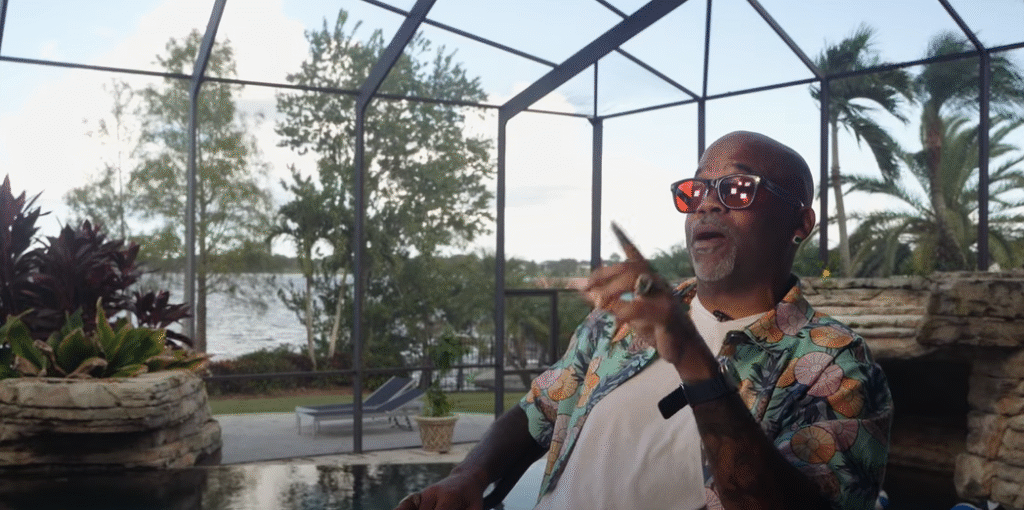Damon “Dame” Dash established himself as a brazen hip-hop success architect by co-founding Roc-A-Fella Records and transforming street-driven ambition into an empire that had a lasting cultural impact. But in recent days, his growing legal troubles have garnered more attention in the news than his victories. Dash is now a case study of how wealth, fame, and failure can become remarkably similar in intensity after being sued repeatedly by filmmaker Josh Webber, having his assets taken away by a court order, and being forced to file for bankruptcy.
His most recent demise was caused by the film project Dear Frank, which spiraled into acrimonious strife. After being fired from the project due to allegations of impropriety, Dash persisted in promoting the film under a different title, which sparked ownership disputes. He was ordered by the courts to pay Webber and Muddy Water Pictures $823,000 in 2022 for defamation and copyright infringement. Even though that ruling would have been harsh enough, his problems got worse when he accused Webber of stealing during an interview with the Earn Your Leisure podcast. After Dash disregarded courtroom protocol, a judge decided in Webber’s favor and issued a $4 million default judgment in early 2025 after the lighthearted but scathing comments went viral.
The repercussions have been very evident. A federal judge forced him to give up control of Dash Films, Bluroc LLC, and other businesses in order to pay off debts, and U.S. Marshals were given permission to sell their assets at auction. The forced sale of his one-third interest in Roc-A-Fella Records, which he once declared was evidence of his unwavering vision, was perhaps the most symbolic. Seeing those shares go out of his hands brought home the increasingly obvious connection between past success and current adversity.
Bio Data and Professional Information of Dame Dash
| Category | Details |
|---|---|
| Full Name | Damon Anthony Dash |
| Age | 54 (born May 3, 1971) |
| Birthplace | Harlem, New York City, USA |
| Profession | Entrepreneur, Record Executive, Film Producer |
| Known For | Co-founder of Roc-A-Fella Records with Jay-Z and Kareem “Biggs” Burke |
| Key Businesses | Dash Films Inc., Bluroc LLC, Poppington LLC, Dame Dash Studios |
| Major Controversy | Sued for defamation and copyright infringement over film Dear Frank |
| Legal Judgments | Ordered to pay $823,000 (2022) and $4 million (2025) in lawsuits |
| Financial Issues | Filed for bankruptcy in 2025 citing $25 million in debt |
| Authentic Source | New York Post Coverage |

In addition to Webber’s lawsuits, Dash has large tax debts in several states and owes Cindy Morales and Rachel Roy, his ex-partners, child support. He declared more than $25 million in debt when he filed for bankruptcy in September 2025 as a result of these responsibilities, which were on top of judgments. He has characterized the filing as a strategic reset rather than a surrender, asserting that “investing in dreams” resulted in financial overstretching. However, his creditors contend that it is a strategy to postpone payment, raising questions about whether redemption is possible.
The drama is especially inventive in the way it captures the state of contemporary entertainment. In the past, disagreements over artist contracts or movie rights might have been resolved amicably in boardrooms. These days, a podcast tirade has the power to turn casual comments into multimillion-dollar liabilities and serve as the cornerstone of legal action. In a time when every word is captured, circulated, and closely examined, the Webber case highlights how brittle reputations can be.
It also puts Dash in a long line of successful music businesspeople who failed due to financial and legal issues. While Kanye West’s enormous wealth has fluctuated with controversies and canceled partnerships, Suge Knight’s empire fell apart due to violence and lawsuits. Resilience is the defining characteristic of legacy, as the arc effectively illustrates how fame magnifies both victories and losses.
Notably, the culture Dash helped create continues to support him. He received encouragement on social media from 50 Cent, a master of reinvention following his own bankruptcy, who suggested that failures are simply lessons learned. Dash especially benefits from that support, which serves as a reminder to both supporters and detractors that hip-hop is based as much on comebacks as on confrontations. After all, stories of redemption are what the industry is all about.
However, the financial situation is still dire. His portfolio has been drastically diminished by court orders, and bankruptcy filings indicate few options for the future. Despite their ambition, his film and streaming endeavors have not been able to compete with corporate rivals. The question of whether Dash’s lifelong motto of independence can endure in the absence of robust infrastructure and methodical planning is one that many find unsettling.
His defiance, however, is highly adaptable. Dash continues to be a disruptor, criticizing systems that he believes are exploitative, even in the face of intense scrutiny. Although it has cost him in court, his defiance has long won him admirers who see him as fearless and unyielding. Even when there are serious financial consequences, his insistence on standing alone strikes a chord in a society that values authenticity.

